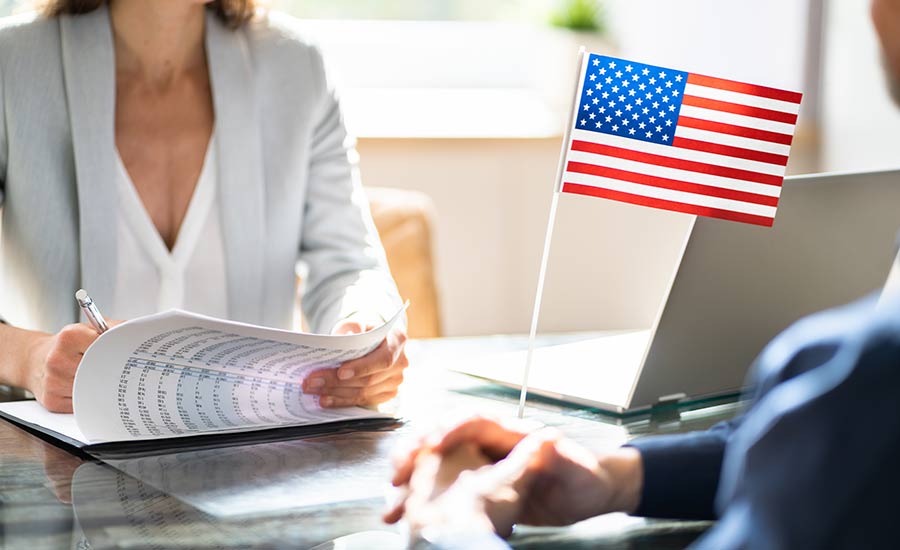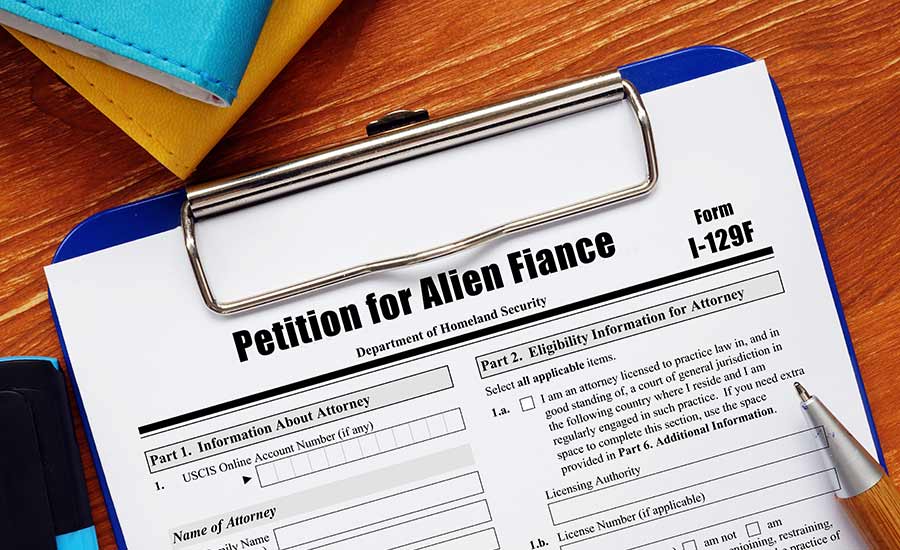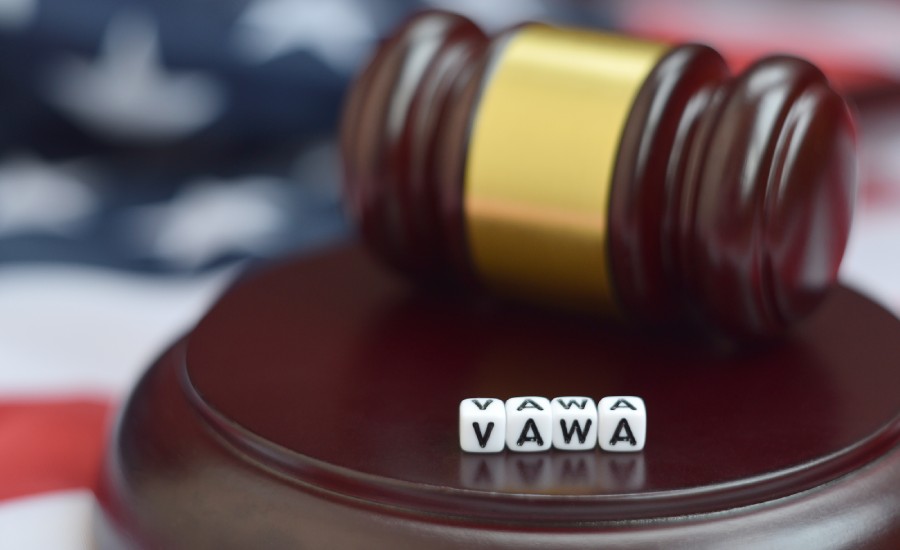

Feeling anxious about the complex K-1 visa process and interview?
We’ll provide sample K-1 visa interview questions, tips on how to prepare, and show how our law firm can help you succeed.
What Is A K-1 Visa Interview?
The K-1 visa interview is a key step in obtaining a K-1 visa, or fiancé visa, which allows a foreign fiancé of a U.S. citizen to enter the United States to get married.
The interview includes questions about relationship history, future plans together, and the fiancé’s background. These questions aim to assess the authenticity of the relationship and ensure the fiancé meets K-1 visa requirements.
The interview is conducted at a U.S. Embassy or Consulate in the fiancé’s home country, usually after the initial K-1 visa petition has been approved by the U.S. Citizenship and Immigration Services (USCIS).
The K-1 visa interview lasts between 15 to 30 minutes. The duration can vary depending on different factors, such as the complexity of the case, and the specific questions or issues that arise during the interview.

K-1 Visa Interview: Sample Questions
The K-visa interview typically covers several key areas to assess the legitimacy of your relationship and your readiness for marriage.
Personal Questions
The aim of personal questions in a K-1 visa interview is to verify your background, character, and consistency with the information provided in your application.
1. Can you provide a brief overview of your background, including your education and work history?
Tip: Provide a concise summary of your educational background and work experience. Focus on key points relevant to your current situation and ensure your information aligns with the information provided in your application.
2. Do you have any previous marriages or children?
Tip: Answer honestly and provide straightforward details about previous marriages or children. Be prepared to submit documentation if needed.
3. Have you traveled internationally before? If so, where and when?
Tip: Mention any international travel you have done, including destinations and dates. Relate your travel experience to your ability to adapt to new environments.
4. Have you ever been denied a visa or had legal issues in the past?
Tip: Be honest and straightforward if you’ve had previous visa denials or legal issues. Explain the circumstances and emphasize how the issues have been resolved.
5. What languages do you speak, and how do you communicate with your fiancé?
Tip: Mention the languages you speak fluently and explain how you and your fiancé communicate. If you use more than one language or rely on translation tools, share how you’ve worked through language barriers.
Questions About Your Fiancé
In a K-1 visa interview, questions about your fiancé aim to confirm that you know their personal details, background, and lifestyle.
1. Can you describe your fiancé’s family, including any siblings?
Tip: Provide a brief overview of your fiancé’s family, including names, relationships, and occupations if you know those. This shows you know your partner’s background.
2. What does your fiancé do for a living?
Tip: Give accurate information about your fiancé’s job, including their role and tenure. If you’re unsure about specifics, it’s okay to say so, but provide as much detail as you can.
3. How would you describe your fiancé’s personality and character?
Tip: Provide a thoughtful and honest description of your fiancé’s personality traits. Focus on qualities that show your appreciation for their character.
4. Can you describe your fiancé’s daily routine?
Tip: Provide details about your fiancé’s daily activities, such as their work schedule, hobbies, and regular commitments. Mention routines or habits that reflect how well you know their lifestyle.
5. What are your fiancé’s long-term career goals?
Tip: Discuss your fiancé’s career ambitions, including professional goals or plans for advancement. If possible, mention any steps they are currently taking toward achieving these goals.
Questions About Your Relationship
The aim of relationship questions in a K-1 visa interview is to assess the genuineness of your connection by evaluating how well you and your partner know each other.
1. Can you provide details about your most recent trip with your fiancé?
Tip: Provide specific information such as dates, locations, and activities. Highlight any significant moments to show the depth of your relationship.
2. How do you and your fiancé typically stay in touch when you are apart?
Tip: Talk about the communication methods you are using, such as phone calls, video chats, or messaging apps. Emphasize the frequency and consistency of your contact.
3. What are some significant events in your relationship?
Tip: Mention key events such as anniversaries, engagements, or trips, and explain their impact on your bond.
4. How did you propose, or how did your fiancé propose to you?
Tip: Share details of the proposal, including the setting and your feelings at the time.
5. Can you describe a recent conversation you had with your fiancé?
Tip: Offer an example of a meaningful conversation, focusing on its content and context. This helps illustrate your ongoing communication and connection.
Questions About Future Plans
Questions about future plans in a K-1 visa interview evaluate the seriousness and stability of your relationship by assessing your plans for life together after marriage.
1. When and where do you plan to get married?
Tip: Provide information about your wedding date and location. Mention any plans or arrangements you’ve made about the guest list, ceremony details and wedding attire.
2. Where do you plan to live after marriage?
Tip: Describe your planned living arrangements and any steps you’ve taken to secure housing. This demonstrates that you have thought about your future together.
3. What are your plans for your future as a couple, including career and family plans?
Tip: Outline your long-term goals, including career aspirations and family plans. Be clear about your vision for your future together and how you plan to achieve it.
4. How do you plan to handle cultural differences after moving to the U.S.?
Tip: Discuss any cultural or lifestyle differences you’ve already talked about and how you’ll address them, such as learning each other’s languages, celebrating both cultures’ traditions, or adjusting to new living conditions.
5. How do you plan to support yourselves financially after marriage?
Tip: Explain your financial plans, such as whether both of you will work, or if one partner will work while the other studies or handles additional responsibilities. Mention any savings, job offers, or plans to seek employment.
How To Prepare For A K-1 Visa Interview
Careful preparation is essential for a successful K-1 visa interview. Here are key tips to improve your chances of a positive outcome.
- Review your application: Go through your application details and make sure your answers match the information you submitted.
- Practice common interview questions: Conduct mock interviews with a friend, family member, or fiancé visa lawyer to simulate the interview environment. Prepare answers for typical questions about your relationship and future plans to boost your confidence.
- Gather and organize supporting documents: Collect and arrange necessary documents like proof of relationship and medical results for easy presentation.
- Dress appropriately: Wear smart casual or slightly formal attire to make a positive impression.
- Be honest and consistent: Answer questions truthfully to avoid raising concerns about your relationship’s authenticity.
- Arrive early: Get to the Embassy or Consulate early to allow time for security checks and additional procedures. Plan extra time for unforeseen delays and have all required documents easily accessible.
Common Mistakes To Avoid At Your K-1 Visa Interview
While preparing for your K-1 visa interview, knowing what to avoid can be just as important as knowing what to do. Below are common mistakes applicants make and tips on how to avoid them.
- Inconsistent information: Providing conflicting answers or incorrect details about your relationship or personal history can raise suspicions. Make sure all information is accurate and consistent with your application.
- Failure to bring required documents: Not having all necessary documents can lead to delays or denials. Make sure you bring a complete set of required documents.
- Overloading on details: Providing excessive or irrelevant details can make your answers seem less focused. Stick to answering questions directly and clearly.
- Being nervous: Signs of excessive discomfort can be interpreted as a red flag for dishonesty. Stay calm throughout the interview.
- Neglecting to follow up: Failing to address requests for additional information or documents promptly can delay your application. Respond to any follow-up requests in a timely manner.
What Happens After A Fiancé Visa Interview
What happens after a K-1 visa interview? Here’s a detailed overview of the next steps:
Decision On Your Visa Application
- If your visa is approved, the Consulate will typically stamp it in your passport. You will also receive a visa packet containing information and documents that you must present to U.S. Customs and Border Protection (CBP) upon arrival in the U.S.
- If your visa is denied, the consular officer will provide a reason for their decision. Common reasons include insufficient evidence of a genuine relationship, issues with the applicant’s background, or missing documentation. Depending on the case, you may be given an opportunity to provide additional information or correct issues.
- If your visa is placed under administrative processing, it will undergo further review, and you may need to provide additional documentation or information. This process can delay the visa issuance.
Travel To The US
Once you receive your K-1 visa, you must enter the U.S. within the specified validity period (usually six months from the date of issuance).
Marriage In The US
Upon arrival in the U.S., you have 90 days to marry your U.S. citizen fiancé. Failure to observe the timeframe can lead to being required to leave the country.
Adjustment Of Status
After your marriage takes place, you can apply for an adjustment of status (AOS) to become a lawful permanent resident (Green Card holder).
This involves filing Form I-485, Application to Register Permanent Residence or Adjust Status with USCIS. Along with your spouse, you will need to provide evidence of the legitimacy of your marriage and possibly attend an interview with USCIS.
Receiving The Green Card
If your adjustment of status application is approved, you will receive a conditional green card which is valid for two years.
To remove conditions and obtain permanent residency status, you and your spouse must file a joint petition within 90 days before the card expires.

How Spar & Bernstein Can Help You With Your K-1 Visa Application
Navigating the K-1 visa process can be daunting, but the knowledgeable immigration lawyers at Spar & Bernstein are here to guide you every step of the way.
Here is what you can expect:
- We will assist with the preparation and filing of your K-1 visa application, ensuring that all forms are correctly filled out and submitted on time.
- We will help gather and organize the necessary supporting documents, including proof of your relationship, financial records, and personal documents.
- We will offer thorough interview preparation, including mock interviews and detailed guidance on how to answer questions and present the strongest possible case.
- We will remain by your side to assist with any follow-up steps, such as responding to consular requests and addressing delays.
- Once you receive your K-1 visa and get married, we will help you adjust your status.
The dedicated team of Spar & Bernstein will stay by your side from start to finish throughout the K-1 visa application process.
K-1 Visa Interview FAQs
To ensure you are fully prepared, we have compiled a list of additional FAQs that address common concerns and provide further clarity on the K-1 visa interview experience.
What happens if I don’t know the answer to a question during the K-1 visa interview?
It’s best to be honest and admit you don’t know the answer. The consular officer may give you an opportunity to provide the information later. Avoid guessing or providing incorrect details.
Can my U.S. citizen fiancé attend the interview with me?
In most cases, the U.S. citizen fiancé does not attend the interview. However, they may be required to submit an affidavit of support or attend a separate interview.
What can I do if I make a mistake during the K-1 visa interview?
If you realize you’ve made a mistake, correct it calmly and promptly. Honesty and transparency can help minimize any negative impact.
How should I handle unexpected or difficult questions during the K-1 visa interview?
Remain calm and take some time to think before answering. If you don’t understand a question, ask the officer for clarification. Honesty and composure can help you handle difficult questions.





